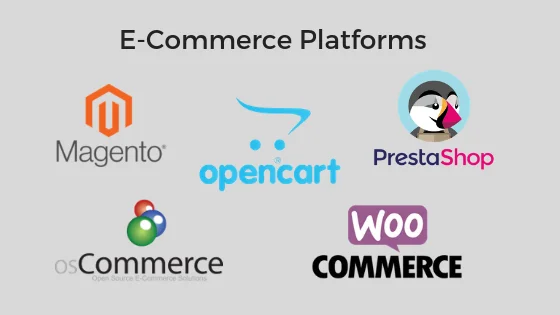The 7 best ecommerce platforms for small businesses in 2024 are Shopify, WooCommerce, BigCommerce, Wix, Squarespace, Magento, and Weebly. These platforms offer user-friendly features and scalability for growing businesses.
Small businesses need reliable ecommerce platforms to thrive in today’s digital marketplace. Choosing the right platform can significantly impact sales and customer engagement. The best ecommerce platforms provide easy-to-use tools, customizable templates, and robust support. They also offer scalability to accommodate business growth.
In 2024, Shopify, WooCommerce, BigCommerce, Wix, Squarespace, Magento, and Weebly stand out. Each platform has unique features catering to different business needs. Whether you are a startup or an established business, these platforms can help you build a strong online presence.

Shopify
Shopify is a leading ecommerce platform designed for small businesses. It offers a user-friendly interface, customizable templates, and a range of powerful tools. Shopify makes it easy to set up and manage an online store, even for those without technical skills.
Key Features
- Drag-and-drop store builder: Easily customize your store with a simple interface.
- Responsive themes: Choose from over 70 themes that look great on any device.
- App integrations: Access over 6,000 apps to enhance your store’s functionality.
- Secure payments: Accept multiple payment methods securely.
- SEO tools: Optimize your store for search engines with built-in SEO features.
- 24/7 support: Get help anytime through phone, chat, or email.
Pricing
| Plan | Monthly Price | Features |
|---|---|---|
| Basic | $29 |
|
| Shopify | $79 |
|
| Advanced | $299 |
|
Pros And Cons
- Pros:
- Easy to use and set up.
- Extensive app store for added functionality.
- Beautiful and responsive themes.
- Cons:
- Transaction fees for non-Shopify payments.
- Costs can add up with apps and add-ons.

Woocommerce
WooCommerce is a popular choice for small businesses. It is a powerful eCommerce plugin for WordPress. It turns any WordPress site into a fully functional online store. It is flexible and customizable. It is perfect for those already familiar with WordPress.
Key Features
- Open-source: WooCommerce is an open-source platform. This allows for endless customization.
- Integration: It integrates seamlessly with WordPress. This is ideal for WordPress users.
- Extensions: WooCommerce offers many extensions and plugins. These add extra functionality to your store.
- Payment Options: It supports various payment gateways. These include PayPal, Stripe, and more.
- SEO Friendly: WooCommerce is built with SEO in mind. This helps your store rank higher in search engines.
Pricing
WooCommerce itself is free to use. However, there are costs associated with running a store:
| Item | Cost |
|---|---|
| Hosting | $5 – $25 per month |
| Domain | $10 – $20 per year |
| Extensions | Varies |
| SSL Certificate | $0 – $100 per year |
Pros And Cons
Pros:
- Highly customizable with many plugins and themes.
- Works seamlessly with WordPress.
- Supports many payment gateways.
- SEO-friendly to boost search engine rankings.
- Large community for support and tutorials.
Cons:
- Requires some technical knowledge to set up.
- Additional costs for hosting and extensions.
- Can be complex for beginners.
Bigcommerce
Choosing the right ecommerce platform is crucial for small businesses. BigCommerce stands out in 2024 with its robust features and scalability. It caters to businesses of all sizes, offering flexibility and ease of use.
Key Features
- Product Management: Easily manage your inventory with advanced tools.
- SEO Tools: Built-in SEO features help improve your search rankings.
- Mobile Optimization: Responsive design ensures a seamless mobile experience.
- Payment Gateways: Supports multiple payment options for customer convenience.
- Integration: Integrates with popular apps like MailChimp and QuickBooks.
- Security: Offers high-level security features to protect your data.
Pricing
| Plan | Monthly Cost | Features |
|---|---|---|
| Standard | $29.95 | Basic features, no transaction fees |
| Plus | $79.95 | Advanced marketing tools, customer segmentation |
| Pro | $299.95 | Custom SSL, Google customer reviews |
| Enterprise | Custom | Custom pricing for large businesses |
Pros And Cons
- Pros:
- High scalability for growing businesses.
- No transaction fees on any plan.
- Extensive SEO tools for better visibility.
- Cons:
- Higher pricing compared to some competitors.
- Advanced features may require a learning curve.
Squarespace
Squarespace is a popular ecommerce platform known for its stunning designs and user-friendly interface. It is an excellent choice for small businesses looking to establish a professional online presence. With a variety of customizable templates and robust ecommerce tools, Squarespace simplifies the process of setting up and managing an online store.
Key Features
- Beautiful Templates: Access a wide range of designer templates.
- Drag-and-Drop Builder: Easily customize your site with a drag-and-drop interface.
- Integrated Ecommerce: Built-in tools for product management, inventory, and orders.
- SEO Tools: Built-in SEO features to help improve your search engine rankings.
- Mobile Optimization: Ensure your store looks great on all devices.
- 24/7 Support: Access customer support anytime you need help.
Pricing
| Plan | Monthly Cost | Features |
|---|---|---|
| Personal | $16 | Basic features, no ecommerce. |
| Business | $26 | Includes ecommerce with a transaction fee. |
| Basic Commerce | $30 | No transaction fees, advanced ecommerce tools. |
| Advanced Commerce | $46 | All features, including abandoned cart recovery. |
Pros And Cons
- Pros:
- Stunning, professional templates.
- Easy to use, even for beginners.
- All-in-one platform with hosting included.
- Strong customer support.
- Cons:
- Limited customization compared to other platforms.
- Transaction fees on lower-tier plans.
- Fewer third-party app integrations.
Wix
Wix is a popular ecommerce platform for small businesses. It offers user-friendly website building tools and a range of ecommerce features. Wix enables small businesses to create professional online stores without any coding skills.
Key Features
Wix provides a variety of features that make it an excellent choice for small businesses. Here are some key features:
- Drag-and-Drop Builder: Easily design your store with a simple drag-and-drop interface.
- Customizable Templates: Choose from a wide range of customizable templates.
- Mobile Optimization: Ensure your store looks great on all devices.
- SEO Tools: Built-in SEO tools to help your store rank higher in search engines.
- App Market: Access to numerous apps to enhance your store’s functionality.
Pricing
Wix offers several pricing plans suitable for small businesses. Below is a summary of the ecommerce pricing plans:
| Plan | Monthly Cost | Features |
|---|---|---|
| Basic | $23 | Basic ecommerce features, 20 GB storage |
| Unlimited | $27 | Unlimited bandwidth, 35 GB storage |
| VIP | $49 | Priority support, 50 GB storage |
Pros And Cons
Here are the pros and cons of using Wix for your small business ecommerce needs:
Pros:- Easy to use with a drag-and-drop builder
- Wide range of customizable templates
- Mobile-optimized design
- Built-in SEO tools
- Access to an extensive app market
- Limited scalability for larger stores
- Transaction fees on certain plans
- Some advanced features require additional apps
Magento
Magento stands out as a powerful eCommerce platform, ideal for small businesses aiming to scale. It offers a wide range of features that cater to various business needs. With its robust capabilities, Magento has become a popular choice among eCommerce entrepreneurs.
Key Features
- Customizable Themes: Magento provides numerous customizable themes to fit any brand.
- Advanced SEO: Built-in SEO features help improve search engine rankings.
- Mobile-Friendly: Mobile responsiveness is a key feature, enhancing user experience on all devices.
- Multi-Store Management: Manage multiple stores from a single dashboard.
- Extensive Extensions: Thousands of extensions are available for added functionality.
- Scalability: The platform can handle large product catalogs and high traffic.
Pricing
Magento offers two main versions: Magento Open Source and Magento Commerce.
| Version | Cost |
|---|---|
| Magento Open Source | Free, but hosting and other services cost extra. |
| Magento Commerce | Starts at $22,000 per year, suitable for larger businesses. |
Pros And Cons
| Pros | Cons |
|---|---|
|
|
Weebly
Weebly is a user-friendly ecommerce platform. It is popular among small businesses. With its drag-and-drop interface, anyone can create an online store quickly.
Key Features
- Drag-and-Drop Builder: Easily create and customize your website.
- Mobile-Responsive Themes: All themes are optimized for mobile devices.
- Integrated Shopping Cart: Includes a built-in shopping cart for smooth transactions.
- SEO Tools: Advanced tools to improve your website’s search engine ranking.
- App Center: Access to various apps to extend your store’s functionality.
Pricing
| Plan | Price | Features |
|---|---|---|
| Free | $0/month | Basic features, Weebly branding |
| Personal | $6/month | Custom domain, more storage |
| Professional | $12/month | Advanced features, no ads |
| Performance | $26/month | Complete ecommerce features |
Pros And Cons
- Pros:
- Easy to use for beginners.
- Affordable pricing plans.
- Great customer support.
- Cons:
- Limited customization options.
- Transaction fees on lower plans.
- Fewer advanced ecommerce features.
Comparison Table
Choosing the right ecommerce platform can be daunting. To help you, we’ve created a detailed Comparison Table. This will highlight the key features and pricing of the top 7 ecommerce platforms for small businesses in 2024.
Feature Comparison
This section compares the features of each platform. It will help you determine which platform best suits your needs.
| Platform | Ease of Use | Customization | SEO Tools | Support |
|---|---|---|---|---|
| Shopify | Very Easy | High | Excellent | 24/7 Support |
| WooCommerce | Moderate | Very High | Good | Community Support |
| BigCommerce | Easy | High | Excellent | 24/7 Support |
| Wix | Very Easy | Moderate | Good | 24/7 Support |
| Squarespace | Easy | Moderate | Good | Email Support |
| Magento | Challenging | Very High | Excellent | Community Support |
| Weebly | Very Easy | Low | Basic | 24/7 Support |
Pricing Comparison
Understanding the cost of each platform is crucial. This section compares the pricing plans of each ecommerce platform.
| Platform | Basic Plan | Standard Plan | Premium Plan |
|---|---|---|---|
| Shopify | $29/month | $79/month | $299/month |
| WooCommerce | Free | Variable | Variable |
| BigCommerce | $29.95/month | $79.95/month | $299.95/month |
| Wix | $23/month | $27/month | $49/month |
| Squarespace | $18/month | $26/month | $40/month |
| Magento | Free | Variable | Variable |
| Weebly | $12/month | $25/month | $38/month |

Frequently Asked Questions
What Are The Top Ecommerce Platforms For 2024?
The top ecommerce platforms for 2024 include Shopify, WooCommerce, BigCommerce, Wix, Squarespace, and Magento. Each offers unique features for small businesses. Shopify is user-friendly, while WooCommerce is great for WordPress users. BigCommerce provides scalability, and Wix and Squarespace are ideal for beginners.
Magento offers advanced customization.
Which Ecommerce Platform Is Best For Small Businesses?
Shopify is often considered the best for small businesses. It offers easy setup, numerous features, and excellent customer support. Shopify’s user-friendly interface and extensive app store make it ideal for beginners. Its scalability means it can grow with your business, making it a versatile choice.
How Does Woocommerce Compare To Shopify?
WooCommerce is a WordPress plugin, while Shopify is a standalone platform. WooCommerce offers more customization options and is free to start. However, Shopify provides an all-in-one solution with hosting, security, and support included. WooCommerce may require more technical knowledge, but it offers greater flexibility.
Is Wix Good For Ecommerce?
Yes, Wix is good for ecommerce, especially for beginners. It offers an intuitive drag-and-drop builder, various templates, and essential ecommerce features. Wix also provides integrated payment options and SEO tools. However, it may not be as scalable as other platforms like Shopify or BigCommerce for larger stores.
Conclusion
Choosing the right ecommerce platform is essential for small businesses in 2024. Each platform offers unique features tailored to different needs. Evaluate your business goals and budget. This guide helps you make an informed decision. Start growing your online store with the best ecommerce platform today.
